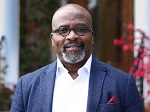Dr. Oyedeji Ayonrinde is an Associate Professor of Psychiatry and has been at Queen’s since the summer of 2017. He was recently appointed as Chair, Commission on Black Medical Students. His interests include cannabis across the lifespan, youth mental health, the impact of social determinants of health and organizational behaviour in healthcare, which was the focus of his MBA thesis. “Currently, I also focus on the impact of COVID on vulnerable people with mental disorders,” he said, “the digital divide has grown much larger, and many people are being left behind”. Dr. Ayonrinde is proud of the collaborative work done to strengthen the relationship with health services in Tyendinaga, an indigenous Mohawk territory at the Bay of Quinte, in Hastings County in Ontario.
since the summer of 2017. He was recently appointed as Chair, Commission on Black Medical Students. His interests include cannabis across the lifespan, youth mental health, the impact of social determinants of health and organizational behaviour in healthcare, which was the focus of his MBA thesis. “Currently, I also focus on the impact of COVID on vulnerable people with mental disorders,” he said, “the digital divide has grown much larger, and many people are being left behind”. Dr. Ayonrinde is proud of the collaborative work done to strengthen the relationship with health services in Tyendinaga, an indigenous Mohawk territory at the Bay of Quinte, in Hastings County in Ontario.
As a clinician, Dr. Ayonrinde is the Clinical Director for community mental health programs at Providence Care. “I’m part of an Assertive Community Treatment psychosocial rehabilitation team; it’s a frontline community-based program, supporting people with complex mental disorders with a view to giving them as good a functional recovery as possible.” “Our vision is to provide a mental health care for the community, in collaboration with the community and delivered by the community.” The service also has 10 community-based vocational companies (VOCEC), including a train component assembly, car wash, cleaning, and catering services. Together these businesses employ over 100 people who would otherwise face significant barriers to employment. One such business, ‘At The Lake Café’ is located in the heart of Providence Care Hospital. The café serves over 100,000 customers per year and is a favourite of clients, staff and visitors and contributes greatly to the hospital’s welcoming and inclusive atmosphere. “People working in the businesses, with lived experience bring exceptional compassion, commitment and care to the customers they serve in their different roles as ‘Business Associates’.” VOCEC employees have their own board, and benefit from support and partnerships with the local business community. It is a great credit to the community that some of our most vulnerable in some aspects of their lives are proudly employed and giving so much. “Our community offices have been cleaned to high IPAC standards all through the pandemic by cleaning company Business Associates – they are truly unsung heroes, and we owe a lot of our wellness to them” Dr. Ayonrinde said – “they all do a sterling job.”
As the new Chair, Commission on Black Medical Students, Dr. Ayonrinde said former Dean Dr. Reznik and his Commission predecessor Dr. Mala Joneja did a great job to lay the foundation, and for him, the role is “an honour and a privilege because we are talking about an opportunity to address issues that are over a century old and includes the expulsion and exclusion of Black medical students from Queen’s in 1918. To be part of rewriting a historical legacy with Queen’s and the exciting initiatives and processes driven by the Faculty of Health Sciences and Dean Philpott is really a great privilege.”
In the role, Dr. Ayonrinde hopes to support Queen’s in the process of recruiting Black medical students, and faculty. “It has been suggested that Queen’s has not always been the most attractive place for Black medical students but I am confident it has potential to become a welcoming university where Black applicants can thrive, flourish, and progress to become successful and fulfilled global physicians of the future. There’s an exciting world of service ahead of them” he said. “It’s no secret Black faculty are hyper-visible yet invisible to medical students. Given the sparse number of Black faculty, it’s really exciting to get support from Black physicians in Canada and also from around the world to support Queen’s programs”
One example is Dr. Bennet Omalu, a forensic pathologist credited with the description of Chronic Traumatic Encephalopathy (featured in the film – “Concussion”) and several other physicians in the US, UK, Australia and some parts of Africa, who are committed to mentoring the Black student to physician process. “There are currently only five Black medical students at Queen’s and none have seen a Black surgeon. It is exciting that a Black surgeon in southern California has been in touch,” Dr. Ayonrinde said. “The commitment in line with the Dean’s objectives has been really amazing from around the world. Please stay tuned for the guest speaker series”
If you or someone you know wants to support the Commission on Black Medical Students, Dr. Ayonrinde says there are ways you can help. “Please get in touch, there are opportunities to support students alongside UGME and PGME initiatives as well as harnessing networks, and supporting research and scholarship. And most importantly, listening to their experiences and stories, sometimes these students are cautious, reserved or anxious to share their stories, so listening is important.”
Alongside his responsibilities as a community psychiatrist, Dr. Ayonrinde says he is excited to be in this new role as Chair of the Commission on Black Medical Students. “To be an ambassador of Queen’s in Black communities, to inspire interest in medicine in young people from diverse backgrounds, helping them believe it’s achievable and giving them permission to dream.”
